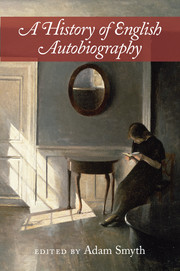Book contents
- Frontmatter
- Dedication
- Contents
- List of contributors
- 1 Introduction: The range, limits, and potentials of the form
- PART 1 AUTOBIOGRAPHY BEFORE ‘AUTOBIOGRAPHY’ (CA. 1300–1700)
- PART 2 RELIGION, GENDER, THINGS (CA. 1700–1800)
- PART 3 THE MANY NINETEENTH CENTURIES (CA. 1800–1900)
- PART 4 RELATIONAL LIVES AND FORMS OF REMEMBERING (CA. 1890–1930)
- 18 ‘Fusions and interrelations’: Family memoirs of Henry James, Edmund Gosse, and others
- 19 Queer lives: Wilde, Sackville-West, and Woolf
- 20 Anecdotal remembrance: Forms of First and Second World War life-writing
- 21 Experiments in form: Modernism and autobiography in Woolf, Eliot, Mansfield, Lawrence, Joyce, and Richardson
- 22 Psychoanalysis and autobiography
- PART 5 KINDS OF COMMUNITY (CA. 1930-CONTEMPORARY)
- Index
- References
21 - Experiments in form: Modernism and autobiography in Woolf, Eliot, Mansfield, Lawrence, Joyce, and Richardson
from PART 4 - RELATIONAL LIVES AND FORMS OF REMEMBERING (CA. 1890–1930)
Published online by Cambridge University Press: 05 March 2016
- Frontmatter
- Dedication
- Contents
- List of contributors
- 1 Introduction: The range, limits, and potentials of the form
- PART 1 AUTOBIOGRAPHY BEFORE ‘AUTOBIOGRAPHY’ (CA. 1300–1700)
- PART 2 RELIGION, GENDER, THINGS (CA. 1700–1800)
- PART 3 THE MANY NINETEENTH CENTURIES (CA. 1800–1900)
- PART 4 RELATIONAL LIVES AND FORMS OF REMEMBERING (CA. 1890–1930)
- 18 ‘Fusions and interrelations’: Family memoirs of Henry James, Edmund Gosse, and others
- 19 Queer lives: Wilde, Sackville-West, and Woolf
- 20 Anecdotal remembrance: Forms of First and Second World War life-writing
- 21 Experiments in form: Modernism and autobiography in Woolf, Eliot, Mansfield, Lawrence, Joyce, and Richardson
- 22 Psychoanalysis and autobiography
- PART 5 KINDS OF COMMUNITY (CA. 1930-CONTEMPORARY)
- Index
- References
Summary
There has been a long-held assumption that the genre of autobiography did not flourish in the contexts of literary modernism, with few of the writers most fully associated with Anglophone modernism producing fully-fledged autobiographical works. The recent shift away from this view, and the appearance of a number of significant critical works focusing on modernism and autobiography, has a number of causes. One relates to concepts of modernism which have both expanded, to take in ‘moderns’ such as H.G. Wells, among whose publications was the two-volume Experiment in Autobiography (1934), and extended, to include the turn-of-the-century writings, including the autobiographical works, of authors such as Henry James and Joseph Conrad. Secondly, the category of autobiography has become more expansive, with the term ‘life-writing’ (originally used in the eighteenth century but deployed in modernist contexts by Virginia Woolf) becoming inclusive of a range of personal writings, including memoirs, letters, and diaries. As a related point, the extensive publication in recent decades of such personal writings (as in the ongoing publication of Samuel Beckett's Letters), as well as manuscript versions of texts, has led to a new, or renewed, focus on the person of the author and the processes and stages of literary creation. Such a ‘genetic criticism’, while not necessarily concerned with the lives of authors, has contributed to the sense that the life and the work cannot, after all, be seen (as they were in much mid-twentieth-century structuralist criticism) as radically distinct.
While the perception that modernism excluded autobiography is thus questionable, the attitudes of many modernist writers towards autobiography were ambivalent and often contradictory. The period produced many highly ‘autobiographical’ fictions, including those by Mansfield, Joyce, Lawrence, Richardson, and Woolf, but their authors frequently expressed a distaste for ‘confessional’ literature and produced far fewer direct autobiographies (that is, works explicitly declared to be the story of the lives of their authors) than the generation of writers preceding them. One reason for this was, as a number of critics have suggested, the development of an increasingly ‘aesthetic’ approach to autobiography, in which the divide between fiction and autobiography became ever less absolute.
- Type
- Chapter
- Information
- A History of English Autobiography , pp. 298 - 312Publisher: Cambridge University PressPrint publication year: 2016



